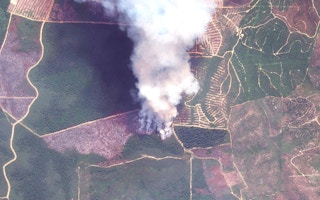Malaysia has urged the Indonesian government to take stern action against companies including those from Malaysia found to carry out forest and estate burning there, resulting in the haze.
Minister of Natural Resources and Environment, Datuk Seri Dr Wan Junaidi Tuanku Jaafar said Malaysia’s stand was clear, that it would not side with any Malaysian company which committed offences and did not follow the law in other countries.
“Malaysian companies which operate here are subject to Indonesian law, so it is up to the government of the republic to take appropriate action on them if they are guilty,” he told reporters after attending a meeting with several members of the Dewan Perwakilan Rakyat (Indonesian House of Representatives), on Tuesday.
The Malaysian delegation was led by Minister of Federal Territories, Datuk Seri Tengku Adnan Tengku Mansor on a one-day working visit to Jakarta today as a special representative of the Malaysian Cabinet for talks on the problem of the haze.
Besides meeting several members of the DPR, the delegation also held talks with the Indonesian Minister of Environment and Forestry Dr Siti Nurbaya Bakar at her office to discuss specific issues concerning the haze.
Wan Junaidi said Indonesia must be stern and not compromise with any individual or estate company from any country which purposely burnt forest and agricultural areas.
He said Malaysia also hoped a memorandum of understanding on efforts to resolve the haze issue in ASEAN nations, scheduled for last July, would be signed soon.
Meanwhile, Tengku Adnan said that the real intention of the Cabinet special delegation meeting with the Indonesian authorities was to find ways to resolve the haze problem together and not point fingers at anyone.
“We came to discuss the best ways to resolve the on-going problem. We understand the problem faced by Indonesia, so we are discussing together to resolve it,” he said.
The local media reported recently that the Indonesian authorities had identified five Malaysian-owned estates believed to be involved in the burning of forest and agricultural areas in the country as a re-planting method.








